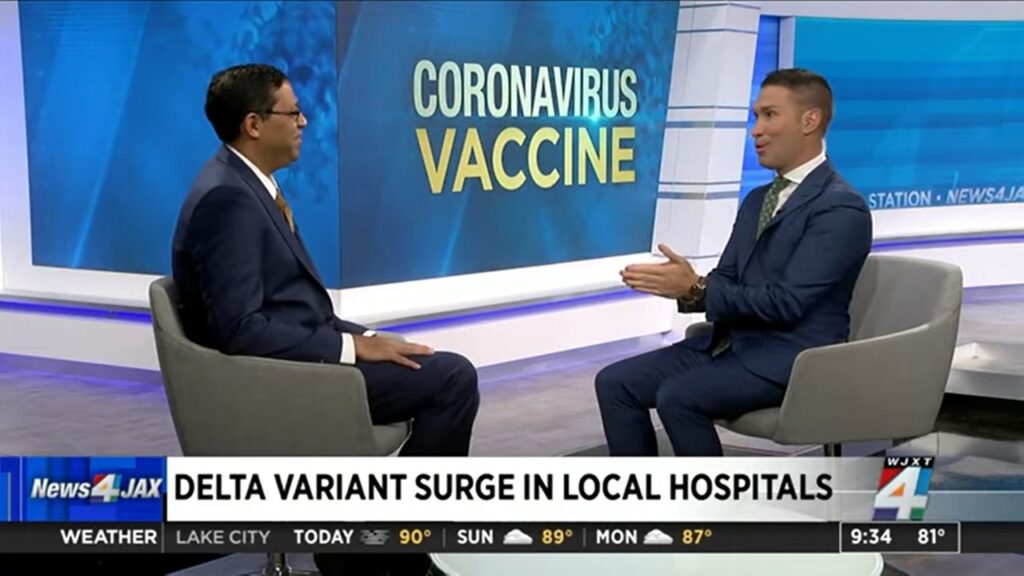The most recent concern for the U.S. regarding COVID-19 has been the spread of the contagious Delta variant. It first appeared in India in December of 2020, spread to the U.K. and other countries, and is now poised to become the dominant strain stateside. This is attributed to its higher transmissibility, as well as lower vaccination rates and reduced social distancing measures. As a result, patient questions about COVID are on the rise. Here’s what triage nurses have learned about Delta thus far, information that patients should know to protect against it, as well as feedback from Dr. Ravi Raheja’s recent interview (above) with Jacksonville’s News Channel 4.
Good news for vaccine protection
Moderna recently announced that its current vaccine produces protective antibodies against the Delta variant. According to Bloomberg, the pharma company states that while their vaccine’s overall effectiveness against the strain was not directly measured, blood tests indicate that antibody levels are “thought to be high enough to prevent disease.”
They’re not alone in their optimism. Pfizer reports that its vaccine is roughly 90 percent effective.
Are Delta symptoms the same as other variants?
According to Yale Medicine, symptoms “like cough and loss of smell are less common,” while others like “headache, sore throat, runny nose, and fever” are still reported. However, because we’re still in the early stages of studying this variant, we need more time to understand how it operates, all indications of infection, and whether our current vaccination efforts are sufficient for suppressing it — including whether an additional booster shot developed specifically for this strain may be required, as Pfizer has suggested.
Is the vaccine our best option?
Yes — for those who are able to get it. Some individuals may have underlying health conditions that preclude them from getting vaccinated, or because their age group — specifically, those under 12 years — doesn’t have one available yet. In this video, Ravi Raheja, MD discusses the vaccine approved for children 12 and up, so the reality for those who are younger is to continue practicing social distancing and mask-wearing in order to protect themselves.
Delta has been shown to be more transmissible in younger individuals and those under 50, making it imperative that these concerns be taken seriously in order to prevent spread. Otherwise, communities risk increased infection rates like we’ve seen in Southern and Appalachian states, as well as the possibility of “hyperlocal outbreaks” — all of which could overburden hospital systems and lead to increased death.
What if I have questions?
When in doubt, contact your primary care provider or a medical professional to discuss your questions and concerns about COVID-19 symptoms, spread, and preventative measures. Nurse triage support lines are also great resources that can answer your questions 24/7, using updated protocols to address COVID-19 that were developed by Drs. Schmitt and Thompson.
For providers: if you’re in need of these updated COVID protocols, we’re currently offering them for free. You may also benefit from telehealth support through our call center that can provide dispositions for patient care, address telehealth eligibility with your practice, and schedule appointments. If you’d like to learn more about these available services, you can contact us through our website, or by calling (800) 723-4290.





